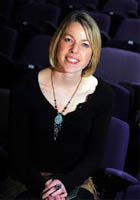Helen Mort Biography
Helen Mort’s first collection, Division Street (Chatto & Windus, 2013), was shortlisted for the T.S. Eliot Prize and the Costa Prize. Her second, No Map Could Show Them, is forthcoming.
Inside the Northern General
they're trying to burn away
a small piece of your heart.
...
You brought me here to break it off
one muggy Tuesday. A brewing storm,
the pigeons sleek with rain.
My black umbrella flexed its wings.
Damp-skinned, I made for the crush
of bars, where couples slip white pills
from tongue to tongue, light as drizzle,
your fingers through my hair,
the way you nearly sneaked
a little something in my blood.
At the clinic, they asked if I'd tattoos
and I thought again of here -
the jaundiced walls, the knit-knit whine
of needle dotting bone, and, for a moment,
almost wish you'd left your mark;
subtle as the star I cover with t-shirts,
the memory of rain, or your head-down walk
along Division Street, slower each week, pausing
by the pubs, their windows so dim you see
nothing but yourself reflected.
...
Hold me, you said,
the way a glove is held by water.
Black, fingerless, we'd watched it
clutch a path across the pond,
never sure if it was water or wool
that clung fast. The mills are plush apartments now,
flanked by stiff-backed chimneys
and you ache for living voices,
the clank and jostle of machinery,
for something to move in this glassy pool
where once, you were the waterwheel,
I, the dull silver it must
catch and release
as if it can't be held.
...
He hanged himself from a lamp-post
with a length of chain, which made me think
of something else, then something else again.
Paul Muldoon
I
Tonight we're judged by what we fathom
in the unstoked embers of an open fire.
You see livid redcoats, bloodhounds
primed for quarry, you
see the fierce, mute breath of horses.
All I see is the cindered shape
of hare, streaking through flames
to imagined safety.
Between us, we cannot tell who
is gaining ground.
II
Think of windows, opening out,
a sash dividing heat and wilderness.
I'm squinting through, but when I fix
on the treeline, it seems the hillside
has been marching on us
all our lives: scree shifts by increments
each year, rooks are roosting closer
to the doorstep. For all their strength,
the boulders prop their weight
against our hearthstone.
How can I escape
into the wind and light
when it's at the weatherboard,
getting in?
III
No-one who has seen a cat leap
swift and noiseless up
onto a garden fencepost
can ever think themselves as supple.
Well, I couldn't pass a child
in the street without feeling aged
I couldn't overhear a song
without being silenced
and I couldn't stand at the intersection,
watch the traffic lights go from bronze
to red without knowing
I was trapped. To think of them
still there at midnight,
changing for nobody, deft as cats.
IV
There is an artist, far from here,
who renders shoes as mussel shells.
If a shoe can so entirely seem
an object from the deep
then how am I to know my face
from its own reflected alabaster?
Some nights I look behind me,
back into the old French doors
and can't be sure which way
I'm turning; into the room,
or out into the black,
accepting glass.
...
The Inuit have twenty-two words
for snow, I told him, but he didn't want to hear,
didn't raise his head from the bowl of dough,
thumbs kneading flour in a frenzy.
The lawn was freezing over, but the air stayed
empty and I wondered how the Inuit
would name this waiting -
the radio playing to itself in the bathroom,
the sound from the street of
ice-cream vans out of season
in this town where we don't have
twenty-two words for anything,
where I learned the name
for round hills built on plastic
and bothered by seagulls, the bridge
where a man was killed in the strike
and where they want to put street lamps
to keep away the kids.
From the window, I watch
the sky as it starts to fill. In the kitchen,
dad sifts flour, over and over
as if still panning for something.
...
